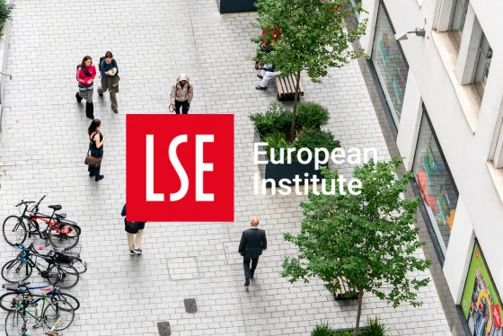Overview
Introduction
The European Institute’s MPhil/PhD programme offers students the opportunity to undertake a substantial piece of work worthy of publication, and which makes an original contribution to the study of contemporary Europe. We offer particular expertise in the subfields of Political Economy, Politics and Policy, Culture and Society, and Migration.
The MPhil/PhD in European Studies welcomes applications for multi-disciplinary, inter-disciplinary and cross-disciplinary research. Students begin on the MPhil, and are upgraded to PhD status once the requirements are met. The School has a long history of research expertise, with European Institute research students having won the prestigious UACES doctoral prize four times.
After graduating, our students have successfully pursued a variety of academic and non-academic careers, in both cases benefitting from the skills, knowledge and contacts built up during their time at LSE.
The MPhil/PhD programme provides a range of opportunities for learning research design and methodological skills, and guides students through the process of defining their topic and pursuing research in a variety of areas. The closeness of the research student community, which meets weekly to discuss students’ projects, and the close involvement of the faculty, make the European Institute a very special place to learn the craft of academic research.
You'll benefit from access to outstanding academic facilities and have the added advantage of being situated in a world-class social science institution with a powerful public profile. The European Institute alone typically offers more than 50 public lectures and seminars per year, and organises events for the world of policy practitioners which provide students with invaluable networking opportunities.
Entry requirements
The minimum entry requirement for this programme is a taught master’s degree (or equivalent), with a minimum of Merit or equivalent, in a related discipline.
Please select your country from the dropdown list below to find out the entry requirements that apply to you.
Overseas
English language requirements
The English language requirement for this programme is Research. Read more about our English language requirements.
Competition for places at LSE is strong. So, even if you meet the minimum entry requirements, this doesn't guarantee you an offer of a place.
However, please don’t feel deterred from applying – we want to hear from all suitably qualified students. Think carefully about how you can put together the strongest possible application to help you stand out.
Programme content
You're expected to take the listed research training and transferable skills courses. You may take other optional courses in addition to those listed below but will need to discuss this with your supervisor. This will be in addition to your research.
Year 1
Year 2
It's highly recommended that students attend and present their work in interdepartmental research seminars, such as the Political Economy and Public Policy Workshop.
Year 3
Year 4
Students aren't expected to take any optional courses in year 4.
Why study with us
Discover more about our students and department.
Meet the department
The European Institute is a multidisciplinary centre for the study of European politics, economics and culture.
Founded in 1991, the institute is the UK's leading centre for the study of Europe, offering a range of master’s programmes and an extensive MPhil/PhD programme. Every year, we welcome more than 200 master’s and 30 doctoral students from all regions of the globe.
Our research spans four key themes – political economy, politics and policy, culture and society, and migration. Teaching and research draw on the expertise of staff from many different disciplines across LSE, including politics, economics and sociology.
The institute is outward facing. We run dozens of events each year, with workshops, seminars and presentations, welcoming high-profile speakers, including former presidents, prime ministers, foreign and finance ministers, distinguished scholars and influential commentators.
Internationally, we’ve forged close links with several partner institutions, including Sciences Po (Paris), Bocconi University (Milan), Fudan University (Shanghai), and Columbia University (New York) with whom we run double master’s programmes.
Why LSE
University of the Year 2025 and 1st in the UK in 2025 and 2026
Times and The Sunday Times - Good University Guide 2025 and 20261st in London for the 14th year running
The Complete University Guide - University League Tables 20266th in the world for the study of social sciences and management
QS World University Rankings by Subject 20256th in the world for leading the way in social and environmental sustainability
QS World University Rankings: Sustainability 2026Your application
Overview
We welcome applications for research projects that complement the research interests of our faculty members. We recommend that you go through our EI PhD supervisors webpage and reach out to potential supervisor(s) before applying.
We carefully consider each application and take into account all the information included on your form, such as your:
- academic achievement (including existing and pending qualifications)
- statement of academic purpose
- references
- CV
- outline research proposal
- sample of written work.
See further information on supporting documents.
You may need to provide evidence of your English language proficiency. See our English language requirements.
Part-time study
Please note that students may apply to study part-time after successful completion of first year.
For students awarded an Economic and Social Research Council (ESRC) studentship, the structure and duration of the studentship offered, including part-time study, will depend on a candidate's previous academic experience, and social research training and experience. ESRC studentships are applicable to both full-time and part-time study. We can discuss part-time options with you if you're interested in applying. International students requiring a student visa should also see the student visas information in the GOV.UK website and the LSE visa advice for more details.
When to apply
The application deadline for this programme is 27 May 2026.
However, if you’d like to be considered for any funding opportunities, you must submit your application (and all supporting documents) by the funding deadline.
See the fees and funding section below for more details.
Fees and funding
The table of fees shows the latest tuition fees for all programmes.
You're charged a fee for your programme. Your tuition fee covers registration and examination fees payable to the School, lectures, classes and individual supervision, lectures given at other colleges under intercollegiate arrangements and, under current arrangements, membership of the Students' Union. It doesn't cover living costs or travel or fieldwork.
Home
Home student fee (2026/27)
The fee is likely to rise over the full duration of the programme. The School charges home research students in line with fee levels recommended by the Research Councils.
Learn more about fee status classification.
Overseas
Overseas student fee (2026/27)
The fee is likely to rise over the full duration of the programme in line with the assumed percentage increase in pay costs (ie, four per cent each year).
Learn more about fee status classification.
Learning and assessment
How you learn
How you're assessed
Progression and assessment
At the end of your first year (full-time), you'll need to take part in the Major Upgrade assessment to progress from MPhil to PhD status.
You're required to submit the following materials to your appointed assessor before your Major Upgrade assessment.
For a standard thesis:
- a research proposal (approximately 2,500 words)
- an abstract of the thesis
- a sample chapter (approximately 8,000 words) and
- a timetable for completion.
For a thesis as a series of publishable papers:
- a research proposal (approximately 2,500 words)
- an abstract covering the three prospective papers
- a full draft of the introduction or a full draft of one of the papers (approximately 8,000 words) and
- a timetable for completion.
In the second year, for a standard thesis you'll be expected to produce at least two further substantive chapters (of approximately 5,000-7,000 words each). For a thesis as a series of publishable papers you will be expected to produce at least one fully written paper (approximately 10,000 words); and outlines of the other two papers (approximately 2,000 words).
In the third year, for a standard thesis you'll be expected to produce a full draft of all core chapters and agreed timetable for completion. For a thesis as a series of publishable papers you'll be expected to produce full drafts of all three papers and an agreed timetable for completion of the thesis. You'll be invited to take part in the Post-Upgrade Progress Panel to present your thesis or papers to external assessors and faculty members.
Graduate destinations
Overview
Students who successfully complete the programme often embark on an academic career.
Career support
From CV workshops through to careers fairs, LSE offers lots of information and support to help you make that all-important step from education into work.
Many of the UK’s top employers give careers presentations at the School during the year and there are numerous workshops covering topics such as job hunting, managing interviews, writing a cover letter and using LinkedIn.
See LSE Careers for further details.

